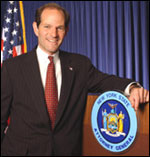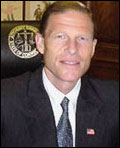
A coal-fired power plant.
Photo: U.S. Geological Survey.
It may have sounded like the understatement of the year when a lawsuit was filed last week against five major U.S. energy companies, alleged to be among the biggest global-warming culprits in the nation, on the legal grounds that they’re causing a “public nuisance.”
In reality it may have been one of the gutsiest legal maneuvers the U.S. has ever seen on climate change — and some observers say it could have the strange side effect of encouraging energy companies to ask the feds for mandatory emissions caps.
Last Wednesday, the chief lawyer for New York City and attorneys general of eight states, including New York, California, Iowa, and Wisconsin, sued industry top dogs — Cinergy Corp., Southern Company, Xcel Energy, American Electric Power Company, and the Tennessee Valley Authority — for coughing up a whopping 10 percent of America’s carbon-dioxide emissions.
States have in the past filed suit against the U.S. EPA for failing to take action on global warming and CO2 emissions, but this time the attorneys general stuck it directly to the polluters.
“We’re the first to agree that federal action to reduce carbon emissions is in order, but that’s clearly not happening, and meanwhile our states are being damaged,” said Judith Enck, policy advisor to New York Attorney General Eliot Spitzer (D), who is spearheading the lawsuit effort. “We can’t just sit idly by.”

Eliot Spitzer.
Spitzer and a handful of other AGs, including Connecticut’s Richard Blumenthal (D) and California’s Bill Lockyer (D), found legal justification for the lawsuit in a series of centuries-old “public nuisance” prohibitions that were adapted from English common law to protect the health of the commons.
The AGs are demanding no financial penalties for the climate damage done so far, but are asking that the energy companies take immediate action to begin reducing their CO2 emissions 3 percent per year for the next 10 years.
“The lawsuit itself is a huge, historic first step toward holding companies accountable for their contributions to climate change,” Blumenthal told Muckraker. “Moreover, the [rate of reduction] we’re asking for is sensible, reasonable, achievable, and could be done at little cost to ratepayers.”
Not surprisingly, the defendants are scoffing at the suit. “We provide energy to customers in 11 states — that is not a nuisance at all. I’m offended by that,” said Wayne Brunetti, CEO of Xcel Energy, during a forum on July 22 sponsored by the Progress and Freedom Foundation. “When I see [the lawsuit], I’m going to find it replete with mis-facts.”
“This brings new meaning to the term ‘nuisance lawsuit,'” said Scott Segal, a partner at the law firm Bracewell and Patterson, which represents industry interests. “They’re trying to apply some 1,000-year-old legal doctrine that was developed to deal with trivial nuisances along the lines of a neighbor throwing trash in the yard next door to this sprawling, ambiguous, and scientifically questionable notion of climate change. There’s not a chance it will hold up in court.”
But according to Blumenthal, the public-nuisance claim is solid: “It’s not arcane or anachronistic; ‘nuisance’ law is still routinely used in modern court decisions.” Common law develops over time through court decisions that establish principles — in this case, principles along the lines of the do-unto-others rule: “It says everyone shares a duty to avoid harming people when there are achievable ways to avoid that harm,” said Blumenthal.
The decision to go forward with this suit was made after three years of research, investigations, and legal theorizing. “We have already devoted a great deal of time and a lot of resources to this effort,” Blumenthal said. “We have not undertaken this action lightly, and we are fully prepared to accept the mammoth effort it would take going forward to bring this suit to trial.”
Mammoth indeed. The power companies in question operate 174 power plants in 20 states. Simply investigating the carbon emissions of these facilities would take years of further research and mountains — quite literally — of documents.
“We have an entire hallway of our office filled with boxes of research documents on the emissions of one coal plant,” Enck told Muckraker. “So to investigate the nearly 200 plants in this case, we’d probably have to build an entire warehouse to house the documents. But don’t think we’re not willing to do it.”
Blumenthal expects the coalition pressing the case to grow considerably as the lawsuit progresses; some AGs hesitated to get involved during an election year. “We considered waiting until after November to try and bring in more bipartisan support, but decided that others can always join in,” he said. “We hope and expect they will.”
As of now, any way you slice it, victory is hardly a sure bet. The unusual application of public-nuisance provisions could be deemed a stretch, and the resources necessary to reach a successful outcome could dry up along the way if the coalition doesn’t grow as expected.
But even a failed case could bring about paradigm-shifting results. Given that this is the first lawsuit over the issue of global warming that goes after individual companies, it sends a clarion call to industry to wake up and smell the massive economic liabilities of global warming.
“There is already rising concern among shareholders about the impact [of global warming] on the value of their investments. If the companies react too slowly to global warming, they could get slammed with hefty fines, either by strict new regulations or by liabilities that come through litigation,” said David Doniger, policy director of the Climate Center at the Natural Resources Defense Council.
This lawsuit makes the prospect of economic liabilities all the more immediate, and that could provoke companies’ shareholders to put increasing pressure on top management to devise strategies to mitigate their impact on the climate.
“If a company came to the table and said, ‘We are committed to reducing our emissions by this amount and date,’ we will be happy to negotiate and carve them out of the lawsuit,” said Enck. “We’d be thrilled if they decided for themselves that it’s time to take initiative.”

Richard Blumenthal.
“Think of this as the tobacco scenario, without the monetary penalties,” Blumenthal said. “Here we don’t want money. All we’re asking is to curb the pollution.”
But it’s only a matter of time before lawsuits will start going after serious monetary penalties, some analysts predict. Increasing asthma and heat-related illnesses, eroding shorelines, drought, floods, thawing permafrost, and loss of forests all have real economic impacts. “The costs of global warming will be deeper and higher the longer we wait to take action,” said Blumenthal. “In that sense you could say we’re doing them a favor, taking action to spare them [ever-increasing] degrees of liability down the line.”
The hope, too, is that as a result of this case, the defendant companies — which have put considerable resources into lobbying against greenhouse-gas regulations — will realize that, ultimately, regulations are a far better prospect for their bottom line than remaining vulnerable to liability suits.
“This lawsuit would force them to clean up their act while their competitors go scot-free,” said Frank O’Donnell, director of Clean Air Trust. “Mandatory CO2 regulations are ultimately a much better option for them because everyone would be required to comply, not just the five biggest companies.”
In the long run, a consistent set of federal regulations would ensure a stable, level playing field for utilities, sheltering them from the volatility of public opinion and continuous litigation. If the states’ lawsuit prompts companies to reevaluate their unstinting, well-funded opposition to emission regulations, it would be a historic case indeed, regardless of the verdict.

